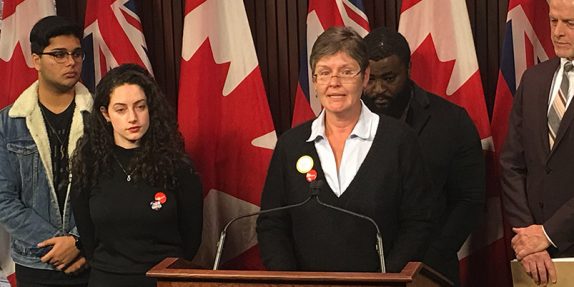Faculty across the province are deeply disappointed that recent improvements to labour laws could be cancelled if Bill 47, Making Ontario Open for Business Act is passed. Rolling back equal pay, options for consolidating bargaining units, fairer rules for joining unions, and other basic rights represent a major step backwards in efforts to address precarious work across the province.
Limited consultation is now taking place on Bill 47 with requests to present at hearings and written recommendations due November 13th and 15th respectively to the Standing Committee on Finance and Economic Affairs.
In a letter sent on November 5th, OCUFA urged the Committee to withdraw all elements of Bill 47 that reverse recent improvements to Ontario’s labour law. Workers on university campuses and in communities across the province are counting on these modest but important labour law improvements to support themselves and their families.
Read the full letter from OCUFA President Gyllian Phillips:
—
Dear Standing Committee on Finance and Economic Affairs,
The Ontario Confederation of University Faculty Associations (OCUFA) represents over 17,000 professors and academic librarians at 29 faculty associations at every university in Ontario. OCUFA represents full-time tenure-stream faculty, and at many universities also represents contract faculty members who work either on a limited-term contract or on a per-course basis.
Faculty across the province are deeply disappointed that recent improvements to labour laws could be cancelled if Bill 47, Making Ontario Open for Business Act is passed. University professors and academic librarians have been strong advocates for improving labour laws to address precarious work and promote decent work. Faculty welcomed the modest and reasonable changes to labour law in Bill 148, Fair Workplaces, Better Jobs Act that brought more fairness to workplaces. Dismantling this legislation will have major implications for faculty and our campus communities.
Equal pay
Under existing labour laws, employers are required to offer the same rate of pay to contract, part-time, casual, temporary and seasonal employees, who are doing substantially the same work in the same workplaces as their full-time or permanent counterparts. As long as the work requires substantially the same skills, effort and responsibility and is performed under similar working conditions, the equal pay provisions apply. There are exceptions in cases of seniority and merit, as well as for “any other factor”. But the criteria must be transparent and accessible to all workers.
This provision has been in effect for seven months, and represents an important step towards fair pay in postsecondary education and throughout the labour market. It has created a welcome new minimum standard of fairness for contract, part-time, and temporary workers. At Ontario colleges, this legislation has resulted in substantive pay increases for thousands of contract faculty. Unfortunately, broad exceptions and loopholes in this equal pay measure have allowed many employers to continue to avoid paying workers fairly, including contract faculty at Ontario universities.
Repealing this provision, as set out in Bill 47, would be a step back for contract workers, at a time when major progress is needed to deliver fairness for contract faculty and address precarious work on our campuses. Over half of university professors in Ontario now work on contract without job security, and too many are doing the same work as their full-time colleagues for lower pay. Repealing equal pay measures will be felt most acutely by already marginalized workers – racialized, female, and gender non-conforming contract faculty often work more hours and are more likely to be in low-income households than their white male peers.
OCUFA recommends that the repeal of equal pay based on employment status be withdrawn. Existing equal pay provisions should remain in place and be improved to remove loopholes that limit effective application for all contract, part-time, casual, temporary and seasonal employees.
Consolidation of bargaining units
Bill 148 brought in two separate measures governing the consolidation of bargaining units. Under the first provision, faculty associations can request that the Ontario Labour Relations Board (OLRB) merge a newly certified bargaining unit with one or more existing units. The second measure allows for a review of the structure of existing units in the same union, but requires agreement from the union and employer to be initiated.
Both are appropriate options for promoting effective and efficient collective bargaining. A number of faculty associations in Ontario have multiple bargaining units as a result of different groups of workers being organized at different times. Consolidation results in less time devoted to bargaining for the union and the employer, and makes collective agreements easier to manage. More efficient bargaining is better for everyone. In addition, having a legal route available to request mergers curbs future fragmentation.
If Bill 47 is passed, these options will be repealed and replaced with a new set of legal parameters for reviewing the structure of bargaining units. Under Bill 47, parties bringing the application forward must prove that the bargaining units are “no longer appropriate for collective bargaining”, which seems to require failure rather than an emphasis on improvement. The legislation also grants expanded powers to the OLRB that undermine a worker’s right to choose their own union representation. It also threatens to destabilize labour relations, especially in instances where more than one union is involved by opening the door to unnecessary workplace conflict.
OCUFA recommends that the new provision for reviewing the structure of bargaining units be withdrawn. Existing options for consolidation of bargaining units should remain in place.
Fairer rules for joining a union
Recent changes to labour law brought modest reforms to make it easier to join a union in Ontario. Workers in home care, building services, and temporary help agencies now have access to card-based certification; unions have access to employee lists in an organizing drive after 20 per cent of the workers show interest in joining a union; access to remedial certification and return-to-work rights after a strike or lockout were improved; and access to first contract arbitration was expanded. The repeal of these rules under Bill 47 represents a major step backwards in ensuring workers have access to collective representation to make improvements to their working conditions.
Unions play an important role in reducing income inequality and improving workplace fairness. At Ontario’s universities, faculty have recognized the value of collective representation for decades. In recent years, as precarious jobs on university campuses are reaching unprecedented numbers, effective unions will be essential for achieving more security, fair pay, and access to benefits. This is not just the case at universities, but also in other sectors of the economy.
OCUFA recommends that all aspects of Bill 47 that make it more difficult for workers to exercise their right to join a union be withdrawn.
Basic rights
Faculty have also been strong advocates for broader fairness measures that the government is attempting to roll back in Bill 47, including the $15 minimum wage, paid sick days, and fair scheduling. Freezing the minimum wage at $14 an hour until October 1, 2020 will hurt low-wage workers who are struggling to pay for basic necessities. This includes our students, many of whom are working part-time jobs at minimum wage to pay high tuition fees. Eliminating two paid sick days and making personal emergency leave provisions more restrictive will mean more workers going to work sick, which is bad for public health. Retracting fair scheduling measures means even less predictability for workers trying to balance childcare, school or other needs with their work life.
Addressing precarious work at Ontario universities is also crucial for ensuring high-quality education for students. Faculty working conditions are student learning conditions. Contract faculty are excellent teachers, but without job security, fair pay or dedicated office space, they cannot always be available to provide the mentorship vital for student success. The same is true for other campus workers who provide services and support to students. The government can support quality education by setting a standard of good jobs at Ontario universities. Rolling back recent gains works against this goal.
OCUFA urges the Standing Committee on Finance and Economic Affairs to withdraw all elements of Bill 47 that reverse recent improvements to Ontario’s labour law. Workers on university campuses and in communities across the province are counting on these modest but important labour law improvements to support themselves and their families.
Sincerely,
Gyllian Phillips, OCUFA President






 Michael Conlon will be the next Executive Director of the Ontario Confederation of University Faculty Associations. Dr. Conlon comes to OCUFA following four years as Executive Director of the Confederation of University Faculty Associations of British Columbia (CUFA BC). He brings with him decades of experience, expertise, and knowledge working in the university sector, including in labour and government relations. Michael will officially take over as Executive Director on January 1, 2019.
Michael Conlon will be the next Executive Director of the Ontario Confederation of University Faculty Associations. Dr. Conlon comes to OCUFA following four years as Executive Director of the Confederation of University Faculty Associations of British Columbia (CUFA BC). He brings with him decades of experience, expertise, and knowledge working in the university sector, including in labour and government relations. Michael will officially take over as Executive Director on January 1, 2019.




